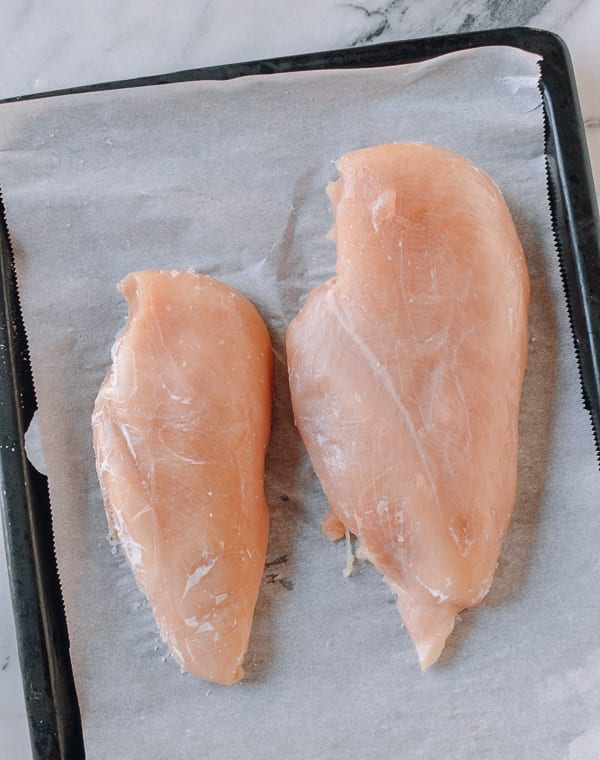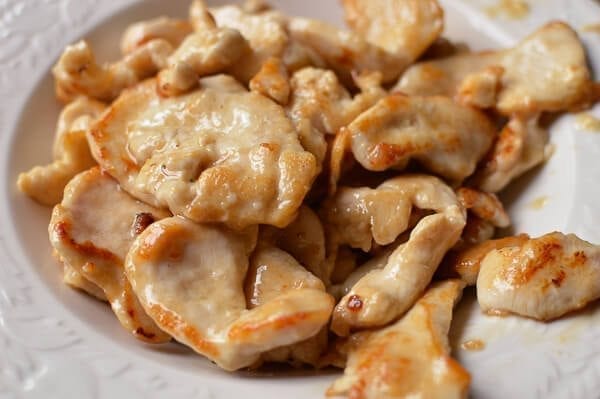Velveting is a critical Chinese cooking technique. Meat or seafood is marinated and pre-cooked in oil or sometimes poached in boiling water. Then, the cook adds it to a stir-fry with other ingredients. In this post, we will teach you how to velvet chicken to yield the most tender and flavorful results for your favorite stir-fries.
Have you ever tried stir-frying chicken, only to have it appear (and taste) dry in the finished dish? Have you ever wondered how Chinese restaurants get their chicken to be so tender and moist-looking?.
The secret is to velvet the chicken. This makes it smooth and silky while keeping the marinade’s flavor and moisture. It also protects the chicken from the hot wok, yielding juicy chicken.
People all over the world love Chinese chicken dishes, which are an important part of Chinese food. It is hard to say no to the juicy, tender chicken covered in tasty sauces. You can always order Chinese food to go, but it’s easier than you think to make it at home. With a few easy tips and tricks, you can make Chinese chicken at home that tastes like it came from a restaurant.
Prepping the Chicken
The key to great Chinese chicken begins with properly preparing the chicken. Here are some tips:
-
Choose boneless, skinless chicken thighs or breasts. Thighs have more fat so they stay juicier, while breasts cook faster. Remove any fat or skin to keep it healthier.
-
Cut the chicken into 1-inch pieces This allows the chicken to cook quickly and absorb the sauce. uniform 1-inch cubes cook evenly.
-
Velvet the chicken. Coating the chicken in a mixture of cornstarch, egg whites, oil, and seasoning is called velveting. This keeps the chicken moist and makes it tender, making it look like silk. Let it sit for 15 to 30 minutes.
-
** Blanch or sear the chicken. **Boil or sear the chicken first to make it less tough before adding it to the main dish. This prevents overcooking later. Boil chicken for 2 minutes in salted water. Cook for one to two minutes in hot oil until the food is lightly browned.
Choose Your Cooking Method
There are several classic cooking methods that result in delicious Chinese chicken. Pick your favorite!
Stir-Frying
In a wok or large skillet, cook chicken over high heat with vegetables and sauce. Toss constantly so it cooks fast and absorbs flavors. Add sauce ingredients like soy sauce, hoisin, oyster sauce, rice vinegar, sesame oil, garlic, and ginger.
Batter-Frying
Coat chicken in a light batter of egg, cornstarch, baking powder, then fry in 350°F oil for 2-3 minutes until crispy. Toss in sauce after frying. Batter frying works great for orange chicken or general tso’s chicken.
Grilling
Season chicken with five-spice powder, soy sauce, honey, or other flavors. Grill on medium heat for 6-8 minutes, flipping once. Brush on sauce in the last 2 minutes. Grilled Chinese chicken is delicious in salads or tacos.
Braising
Place chicken pieces in a pan with garlic, ginger, and spices. Brown them first. Then cook it slowly for 30 to 40 minutes in broth, soy sauce, hoisin, and honey until it is very soft. The braising liquid becomes the flavorful sauce.
Steaming
Place chicken and aromatics like scallions and ginger in a steamer basket. Steam for 15 minutes until chicken is cooked through. Drizzle with soy sauce, sesame oil, and top with scallions. Healthy and light.
Top Sauces for Chinese Chicken
The sauce is what gives Chinese chicken its signature flavor. Whip up one of these easy homemade sauces:
-
Sweet and sour: ketchup, rice vinegar, pineapple juice, soy sauce, garlic, ginger
-
General tso: soy sauce, rice vinegar, hoisin, chili garlic sauce, brown sugar
-
Orange: orange juice, soy sauce, rice vinegar, orange marmalade, garlic
-
Black bean: fermented black beans, soy sauce, garlic, ginger, broth
-
Mongolian: soy sauce, hoisin, garlic, green onions, rice vinegar
-
Sesame: soy sauce, rice vinegar, sesame oil, brown sugar, garlic
Putting It All Together
Follow these steps for restaurant-worthy Chinese chicken:
- Prep chicken – cut, velvet, blanch/sear
- Make your sauce – pick a flavor combo
- Cook chicken and veggies – stir-fry, braise, grill or steam
- Toss everything together to coat chicken in sauce
- Adjust seasoning with extra soy, vinegar, or chili flakes
- Serve over rice with a vegetable side dish
With the right prep, cooking method, and sauce, you can easily make restaurant-quality Chinese chicken dishes at home. Experiment with different recipes until you find your favorites. Impress your family with homemade orange chicken, kung pao chicken, or General tso’s chicken. The possibilities are endless!

How to Slice Chicken for Stir-fries
Do you sometimes find it hard to make thin slices of chicken for a stir-fry? It can be hard to make even slices of chicken when it’s soft and slippery, even with a sharp knife!
I learned the answer the first time I worked in a Chinese restaurant kitchen as a prep guy. I cleaned and sliced vegetables, peeled shrimp, made egg rolls, and yes, I sliced up many chicken breasts!.
Before slicing them, I put them into the walk-in freezer until they were partially frozen––firm but not solid.

Once they are firm, they are very easy to slice into uniform, perfect slices. How’s that for a chef’s trick?.
The chicken does have a “grain” which is the direction of the muscle fibers. It’s less obvious than in a piece of beef or pork, but it is there! It is generally best to cut across the grain for the most tender meat, similar to slicing beef. Something to keep in mind!.
All restaurants (and most home cooks) velvet their chicken before making stir-fries, fried rice, etc. but they don’t all use the same method.
Some restaurants use baking soda as part of their marinade (you can tell by the crunchy or snappy texture of their chicken). In most cases, good quality chicken is already tender, which is why we don’t recommend adding any baking soda.
On rare occasions, you may get a tough chicken breast––a condition called “woody breast,” caused by hardened muscle fibers. No one is sure what causes it, but you may have had it if you’ve ever had a stringy or tough chicken breast. Also, be extra careful to cut across the grain if your chicken has more fibers than usual.
We’ve seen that other sources on the Internet suggest adding egg white to velveting marinades. This is unnecessary.
Your return on that investment just isn’t worth the trouble. In my experience, most Chinese cooks do not do this.
To marinate chicken for stir fries, we use a simple mixture of water, oil, cornstarch, and a flavor agent like soy sauce or oyster sauce. Other ingredients, like Shaoxing wine or sesame oil, may also be layered in.
So What Is Oil Velveting?
Oil velveting is a common practice Chinese restaurants use as a first cooking step. The equivalent Chinese phrase, zǒu yóu (走油) in Mandarin or jau yau in Cantonese, means “passing through oil.” It essentially refers to deep-frying.
We recommend searing the chicken in a hot wok, as opposed to deep-frying. Not only is it easier, searing really brings out the chicken flavor and creates an ever-so-light crust. This crust eventually melts when your chicken is added back into your sauce, creating extra flavor. The result is a silky mouthfeel and a flavor bomb in each bite!

How to Make Takeout Icon General Tso’s Chicken
FAQ
How do the Chinese make their chicken so tender?
Along with super hot woks, Chinese restaurants use a technique called velveting. Velveting is done by marinating chicken in a mixture of egg white, rice vinegar, cornstarch and salt. The marinated chicken is quickly blanched in boiling water, drained and then put directly into the wok.
What makes Chinese fried chicken different?
What makes Chinese Fried Chicken Wings so special? The method of cooking these fried chicken wings is different from your traditional fried chicken wing recipe. Chinese fried chicken wings involve coating the chicken in seasoning, adding cornstarch and flour, and frying the chicken twice.
What to season Chinese chicken with?
Mix honey, hoisin sauce, soy sauce, rice vinegar, toasted sesame oil, and M Mix with a whisk and pour over chicken. Let marinate for at least 2 hours, or overnight in the fridge.
How do you make Chinese garlic chicken?
It will be ready faster than it takes for your favorite restaurant to make and deliver your Chinese Garlic Chicken. Whisk together minced garlic, soy sauce, sesame oil, honey, and cornstarch until smooth. Heat vegetable oil in a large skillet or wok over medium high heat.
How do Chinese restaurants tenderise chicken?
Velveting Chicken: The Chinese restaurant secret to tenderising chicken! Ever notice how the chicken in stir fries at your favourite Chinese restaurant is incredibly tender? It’s because they tenderise chicken using a simple method called Velveting Chicken using baking soda.
Do Chinese cooks marinate chicken for stir fries?
In my experience, most Chinese cooks do not do this. So What Do We Recommend? To marinate chicken for stir fries, we use a simple mixture of water, oil, cornstarch, and a flavor agent like soy sauce or oyster sauce. Other ingredients, like Shaoxing wine or sesame oil, may also be layered in.
Can you make Chinese shredded chicken with scallion sauce?
You can make authentic Chinese shredded chicken at home with just a few simple ingredients and steps. And once you nail that scallion sauce, you can apply it to any meat you have in the fridge as well. The aroma of scallion will turn the most common protein into a feast.
How to make crispy chicken without making a mess?
Now here is the trick to creating crispy chicken with a crunchy coating that is like the takeout you’d get from Chinese restaurants, without making a mess. Simply use the formula: oil + salt + egg + cornstarch You first use the oil and salt to marinate the chicken for 10 to 15 minutes.
Should you cook chicken in a wok or deep frying?
We recommend searing the chicken in a hot wok, as opposed to deep-frying. Not only is it easier, searing really brings out the chicken flavor and creates an ever-so-light crust. This crust eventually melts when your chicken is added back into your sauce, creating extra flavor. The result is a silky mouthfeel and a flavor bomb in each bite!
